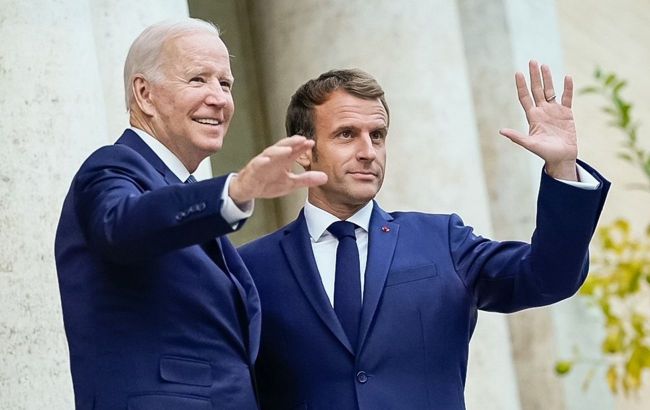Biden and Macron discuss ceasefire scenario between Israel and Hezbollah
 Photo: US President Joe Biden and French President Emmanuel Macron (wikimedia.org)
Photo: US President Joe Biden and French President Emmanuel Macron (wikimedia.org)
US President Joe Biden and French President Emmanuel Macron met on the sidelines of the UN General Assembly to discuss efforts to establish a ceasefire between Israel and the Lebanese group Hezbollah, according to the Financial Times.
According to two individuals informed about the situation, the leaders discussed the likelihood of a 21-day truce during which mediators would work on a long-term agreement.
This cessation of hostilities would be utilized to pursue the full implementation of a UN resolution adopted in 2006 to end the previous conflict between Israel and Hezbollah. The document calls for changes, including the demilitarization of southern Lebanon along the Israeli border.
Macron stated that there must not be war in Lebanon, adding that he would send French Foreign Minister Jean-Noël Barrot to Beirut at the end of the week to prevent a full-scale war.
In response, Biden said he is making every effort to try to halt the fighting.
"I hope that a ceasefire in Lebanon could pave the way to dealing with the (occupied -ed.) West Bank and Gaza," the US leader remarked.
He added that Arab nations in the region were willing to make arrangements with Israel and alliances if Israel changed some policies.
French Foreign Minister Jean-Noël Barrot stated that the US and France would soon provide detailed information on their proposal for a temporary ceasefire in Lebanon.
"We are counting on both parties to accept it without delay, in order to protect civilian populations and allow for diplomatic negotiations to begin," Barrot said during a UN Security Council meeting.
Israel's position
The Financial Times notes that diplomatic meetings and discussions on the truce intensified after Israel Defense Forces’ chief of staff Lieutenant General Herzi Halevi told troops that airstrikes in Lebanon were aimed not only at humiliating Hezbollah but also at preparing the ground for your potential assault. This could mark Israel's first incursion into the country since the 34-day war between the two countries in 2006.
“We are preparing the process of a maneuver, which means your military boots, your maneuvering boots, will enter enemy territory, enter villages that Hizbollah has prepared as large military outposts,” he said.
Risk of a large-scale war in the Middle East
In recent weeks, tensions have escalated significantly between the Israeli army and Hezbollah, which is backed by Iran. Both sides have been launching extensive strikes against positions and settlements in Israel and Lebanon daily.
Three days ago, the Israeli army commenced intense aerial bombardments of Lebanon, targeting thousands of Hezbollah sites. The US does not rule out the possibility that such escalation could evolve into a full-scale war in the Middle East.
The White House has stated that it is working to de-escalate tensions between the conflicting parties.
On September 17-18, explosions from hundreds of pagers and electronic devices occurred among individuals connected to the militants in Lebanon. These events resulted in the deaths of 37 individuals, with several thousand more injured.

